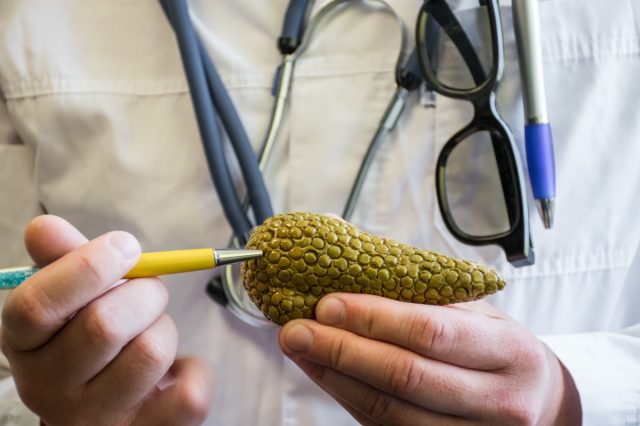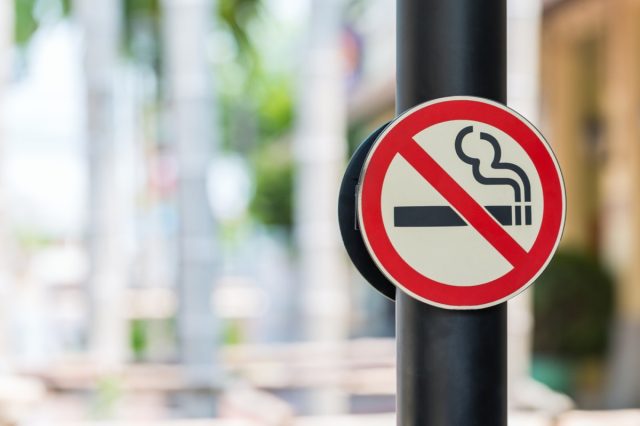Pancreatic cancer is responsible for 3% of all cancers and and 7% of all cancer deaths in the US. Known as the "silent killer," pancreatic cancer is notoriously difficult to spot. "Research shows that a tumor growing in the pancreas can take 12 to 15 years before it becomes invasive," says Christopher Wolfgang, MD, PhD, chief of the Division of Hepatobiliary and Pancreatic Surgery and surgeon with Perlmutter Cancer Center. "If we can find and remove premalignant tumors within that window, we can potentially cure pancreatic cancer with surgery alone. The problem is that many early tumors are invisible. We can't see them on scans. We are developing ways to detect them in the blood, a diagnostic technique called liquid biopsy. The tumors that can be detected on scans are called cystic neoplasms. Most of these lesions are benign, but 3 to 5 percent will undergo malignant transformation. The challenge with these types of tumors is determining which ones to watch and which ones to surgically remove. So that's another big area of research."
According to research published in JAMA, there are six specific gene mutations linked to pancreatic cancer. "This study provides the most comprehensive data to date supporting genetic testing for all pancreatic cancer patients," says Fergus Couch, PhD. "This is the first study to provide estimates on the magnitude of cancer risk associated with each gene. It indicates that family history alone cannot predict who has these mutations." The mutations are also found in people with no family history of the disease.
"There are currently no simple tests for pancreatic cancer," says surgical oncologist Jin He, MD, PhD. "Most cases are found when symptoms develop or an imaging study, such as a CT or MRI scan, is done for another reason. There is active research at Johns Hopkins that is aimed at developing a test for pancreatic cancer in the blood, urine and stool… Unfortunately, most pancreatic cancer cannot be prevented, but you can reduce your risk by maintaining a healthy weight, stopping smoking and limiting your alcohol intake. Other risk factors include chronic pancreatitis and family history. Occasionally, precancerous lesions can be identified and, if removed early, can prevent pancreatic cancer from developing." Here are seven symptoms of pancreatic cancer that are easy to overlook, according to experts.
Digestive Issues

Unexplained digestive issues could be a sign of pancreatic cancer, experts say. "Poor appetite, indigestion and nausea are common in people with pancreatic cancer," says Pancreatic Cancer Action Network (PanCAN). "Some or all of these symptoms may occur when a tumor in the pancreas presses against the stomach or first portion of the small intestine. If this happens, food may remain in the stomach and cause several digestive difficulties, including nausea and vomiting. Digestive symptoms can also occur due to blockage of the pancreatic duct through which the pancreatic enzymes flow or due to changes in pancreatic enzyme production.
"If pancreatic juices don't flow, digestion is not complete, which can cause bloating, lack of appetite and weight loss, when you're not trying to shed pounds," says Heinz-Josef Lenz, MD, an oncologist at USC Norris Comprehensive Cancer Center and a professor of medicine at the Keck School of Medicine of USC. "You may have darker pee and paler stool than usual." Excess bilirubin can make urine look a dark, brownish color, while bilirubin blockage can make stool appear lighter. "Pancreatic cancer can prevent the proper enzymes from getting to the intestines and breaking down fat, making stool appear greasier," Dr. Lenz says.
Weight Loss

Weight loss is a common symptom of pancreatic cancer. "People diagnosed with pancreatic cancer often find it difficult to maintain their weight and follow a healthy diet," says Christi M. Walsh ONC, MSN-CRNP. "The pancreas is an organ located in the abdomen, behind the stomach near the small intestine, gallbladder and duodenum. It has an essential role to help convert the food we eat into fuel for the body's cells. Food may not be digested properly if the pancreas is not functioning due to cancer."
According to Walsh, fatigue is a common symptom to experience with weight loss. "The pancreas has two main functions: an exocrine function that helps in digestion of food and an endocrine function that regulates blood sugar. Even if patients continue to eat and digest food normally, pancreatic cancer releases compounds into the bloodstream that break down muscle and fat, causing patients to lose weight and muscle mass, as well as feel fatigued."
Jaundice

Jaundice is another overlooked symptom of pancreatic cancer that presents itself when the disease is advanced. "So one of the reasons is the pancreas is a long organ that lies along your back, from one side to the other, and depending on where in the pancreas it physically starts, in the geography of the pancreas, will determine what your symptoms are," says Matthew Walsh, MD. "So you can have a relatively small tumor in the very end of the pancreas, near the opening to the duodenum, that can cause jaundice, which is one of the symptoms and that can occur relatively early because if you pinch off the bile duct with a small tumor. But the farther away you get from there, geographically, you can get a bigger tumor that can spread and not be found.
"The most common single symptom is jaundice, and most patients will present to their regular doctor with jaundice or to the emergency room, and they'll be evaluated and chances are they'll have a scan and may get a scope to help relieve the jaundice. And that'll give them either a clear diagnosis, because you can do a type of brush biopsy of a bile duct in someone who has jaundice, and jaundice is just blockage of the bile duct in this case that causes yellowing of the skin and eyes and often very irritating itching. And they'll first notice it actually in their urine. Your urine will turn dark. So if you have those symptoms, obviously see your doctor promptly. And often it's not the patient that notices it, it's a family member. So it's always good to know that."
Sudden Diabetes Diagnosis

Many people are not aware that diabetes can be a symptom of pancreatic cancer. "Long-standing diabetes is a (modest) risk factor for pancreatic cancer," says Suresh Chari, MD. "It causes a modest increase in risk of 1.5- to two-fold. Individuals who've had diabetes for more than five years can be considered at a slightly higher than average risk of developing pancreatic cancer, as noted above. But those with a new onset of diabetes after age 50 have a nearly 1% chance of being diagnosed with pancreatic cancer within three years following their diabetes diagnosis. In this case, the pancreatic tumor caused the diabetes."
But what is the link between diabetes and pancreatic cancer? "It's thought that pancreatic cancer can cause cells in the body to become resistant to insulin, a key hormone produced by the pancreas that helps regulate blood sugar levels," says Dr. Chari. "In other insulin-resistant conditions (like obesity), the insulin-producing cells in the pancreas make more insulin to overcome the insulin resistance. But pancreatic cancer appears to stop the insulin-producing cells of the pancreas from responding adequately to this insulin resistance. This results in the development of diabetes. It's important to note that even though pancreatic neuroendocrine tumors (PNETs) arise from the hormone-producing cells of the pancreas, diabetes is neither a symptom nor risk factor for PNETs… Both diabetes and pancreatic cancer can present with vague symptoms that can be dismissed by doctors and patients, and both can be much more manageable if diagnosed early and accurately. It's important for researchers and clinicians to develop strategies to make sure all patients are correctly diagnosed as early as possible."
Abdominal Pain

Upper abdominal pain is one of the most common signs of pancreatic cancer. "Almost 7 out of 10 people (70%) with pancreatic cancer go to their doctors because they have pain," explains Cancer Research UK. "Pain is more common in cancers of the body and tail of the pancreas. People describe it as a dull pain that feels as if it is boring into you. It can begin in the stomach area and spread around to the back. The pain is worse when you lie down and is better if you sit forward. It can be worse after meals."
"There are very few early warning signs of pancreatic cancer, which makes it difficult to diagnose in its initial stages. If a tumor is in the body or tail of the pancreas, symptoms may appear much later," says Dr. Lenz. "This means the tumor may grow large, before you feel pain or discomfort in your abdomen or back. If any of the symptoms described show up and persist for more than one week, you need to see a doctor."
Smoking

Smoking is strongly linked to pancreatic cancer. "So the only known risk factor is tobacco smoking," says Dr. Walsh. "And obviously, for a lot of reasons, people shouldn't be doing that. There's probably some genetic component, there's some familiar forms, but we don't have that figured out very well and there isn't a genetic test you can do to look for it. As you mentioned, famous people, if you look at Jimmy Carter and his family, a lot of people have had pancreatic cancer except him, interestingly. So there are increased risk with things like chronic pancreatitis, but the only real risk factor is smoking."
"People who smoke are two times more likely to develop pancreatic cancer compared to those who don't," says Joseph Herman, MD, MSc, a member of the Scientific and Medical Advisory Board at PanCAN. "About 20 to 30% of exocrine pancreatic cancer cases – the most common kind of pancreatic cancer – are thought to be attributable to smoking." The good news is that quitting can make a difference immediately. "Especially for people who have other risk factors – like a family history of pancreatic cancer or longstanding diabetes – it's crucial to quit smoking as soon as possible," Dr. Herman says. "Other modifiable risk factors, like maintaining a healthy diet and keeping active, can further decrease an individual's lifetime risk of developing pancreatic cancer."
Being Obese or Overweight

With the majority of Americans being overweight, it's easy to normalize obesity—but being obese increases the risk of pancreatic cancer, experts say. "With the majority of pancreatic and breast cancer patients being overweight or obese at diagnosis, uncovering potential therapeutic targets within the mechanisms that associate obesity with poor cancer prognoses is the first step towards developing remedies that could disrupt this association and significantly improve patient outcome," says Rakesh K. Jain, PhD.
"Being very overweight (obese) is a risk factor for pancreatic cancer. Obese people (body mass index [BMI] of 30 or more) are about 20% more likely to develop pancreatic cancer. Gaining weight as an adult can also increase risk," warns the American Cancer Society. "Carrying extra weight around the waistline may be a risk factor even in people who are not very overweight."
"We know that carrying a high proportion of abdominal fat is associated with increased levels of insulin, so we think this may cause the link between obesity and pancreatic cancer," say researchers from the Women's Health Initiative.
No comments:
Post a Comment